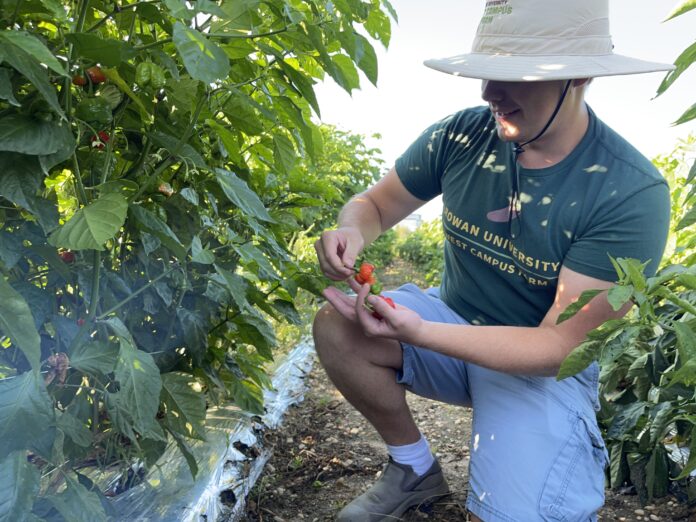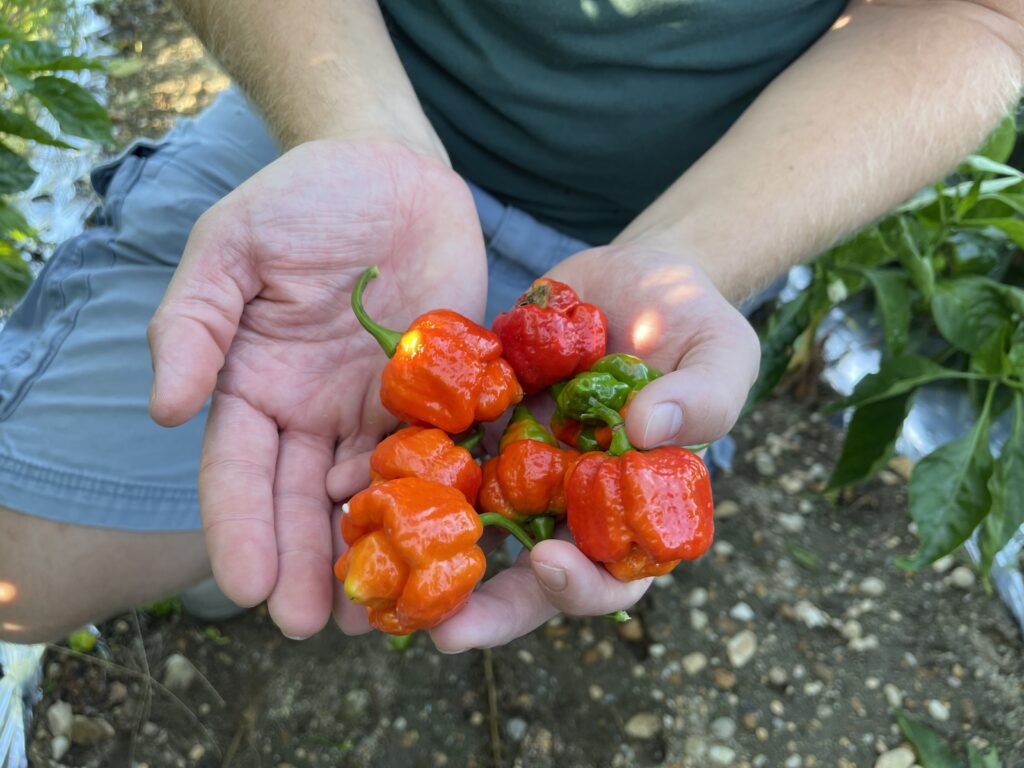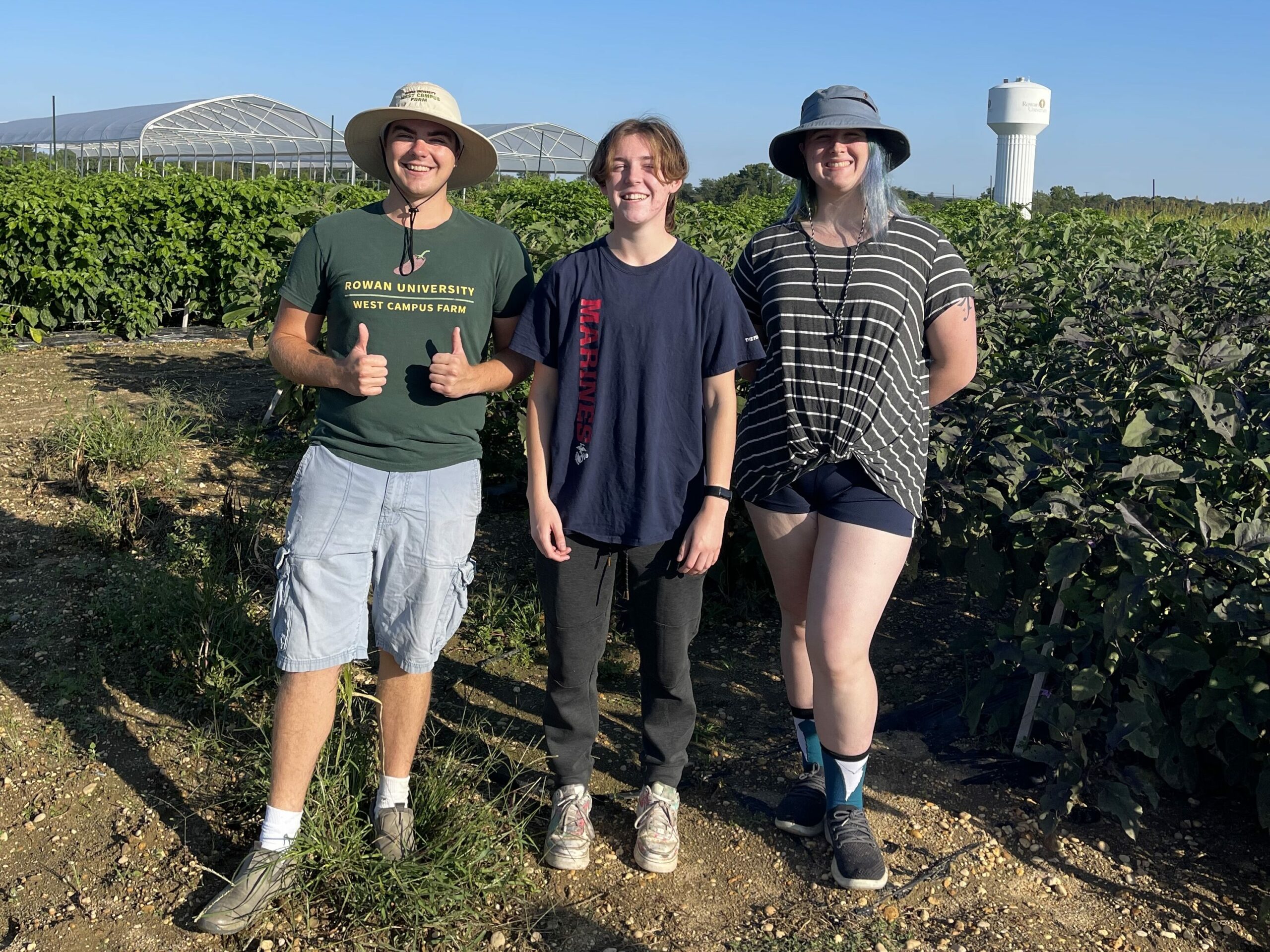
How does the president of the university have time to tend to so many tasks and still have such a strong hand in the thousands of pounds of produce that are used to feed the community and fuel the hot sauce business? The West Campus Farm is home to all of President Houshmand’s seedlings which serve Rowan and communities surrounding with free, fresh, student-picked produce.
“I see anything that grows, anything that is life, I respect. I love, I love life of any sort and I see plants the same way. You know, I go in there sometimes, I’ve got hundreds of hundreds of plants. So who cares about one that is dying? But I do. Because it’s a baby to me. I hate to see that little one [dying] for whatever reason,” said President Houshmand.
In addition to President Houshmand’s at-home seedling nursery, the farm wouldn’t be as fluid with produce if it wasn’t for the students who spend their early mornings and weekends on the estimated two acres of grounds.
Brendan Bermingham, a GIS and environmental and sustainability studies major, spends about nine to 12 hours on the farm per week alongside other student farmers.
“Dr. Houshmand puts [the seeds] in the seed trays… with every single seed… he keeps those at his house and he babies all the plants until they’re little seedlings then he brings them into this greenhouse,” said Bermingham. “All the plants go through him.”
In President Houshmand’s basement, there’s a sub kitchen with a long table where the 90-slot seed tray rests while fluorescent lights spread across the seed nursery from clothing hangers up above.
“I water them two, three, four times a day. Early in the morning before I go to work, lunchtime, or afternoon, before I go to bed, and I water them and heat them and keep them at temperature and suddenly you see these things pop up,” said President Houshmand.
He compared his mindset on the farm to that of when he ran marathons. Houshmand shared that the therapeutic aspects yield a free mind that allows him to think about other responsibilities.
“Time and effort and work is a state of mind. If you have full concentration on what you do and full passion, you really don’t need to spend tons of time to do something… And that’s when your creativity really shines because all of your energy, all of your brain is concentrated on that area,” said President Houshmand. “Once you realize that everything has a solution, it’s easy… So logical thinking and having patience and being persistent… I think the connectivity between heart and mind is critical. If you do that, then you really, you can do tons of stuff.”
This summer, thousands of pounds of produce was harvested and distributed. Just last weekend, they collected about 200 melons equaling around 1,100 pounds.
“So far this summer, we’ve picked a little over 11,000 pounds. So each week, I would say we deliver about 1,000 pounds,” said Bermingham.
Rain or shine, produce is picked to supply one of several local organizations that try to combat food inequality.
“Everything we picked today goes to one food pantry, everything we pick on Thursdays goes to Philabundance and Saturdays goes to the Boys and Girls Club. So, if there’s ever a day we don’t pick, someone might not get their usual delivery from us,” said Bermingham. “As long as it’s not like life-threatening rain, I try to get out here.”
One of the organizations that receives produce from the West Campus Farm is The SHOP, the student pantry on campus, located right on Rowan Boulevard.
Andrew Perrone Ed.D, is the assistant director of the Office of Volunteerism & Community Engagement, which is the department that supports The SHOP. He’s been with the University since 2009 and completed his doctorate in education in 2019. In addition to The SHOP, they also run the Fresh For All Market which is free food for the community every Friday.
“They send us, every Friday morning, a university truck, not like a little pick-up truck, a U-haul-sized truck comes and unloads anywhere from six to 20 boxes of produce. Then we distribute that to local community members,” said Perrone.
A selection of Friday’s produce serves the communities at the two SOM campuses in Stratford and Sewell. The Monday morning delivery goes to The SHOP where they’ll get another four to 10 cases.
“It’s funny, when I first started working with the President’s Office, they reached out to me to say ‘Oh the president has a garden, they have some excess. Would you be able to-’ and I was like, ‘Oh yeah sure, bring it.’ And then they came with like cases and cases. I was like ‘Wait a second.’ ‘Cause I pictured a garden, you know, like a little raised bed on the side of his house– he has a farm. I was expecting like when your neighbors brings over a couple of zucchini, that’s what I thought we were going to get but they send us cases,” said Dr. Perrone.
Not only did they get a few zucchini, but they’ve also got two types of melons and tomatoes this week at The SHOP. At other times they’ve had eggplants, bell peppers, and “insanely hot hot peppers” that are clearly labeled for spiciness.
The peppers are all used to create the different flavors of President Houshmand’s Hazardous Hot Sauce. The peppers portion of the field also includes bell peppers, which are one of the most sought-after ingredients offered at The SHOP.
“Very hot peppers are very finicky and they are not easy to grow. So what I do is I seed them around early March and early March gives me March, April, and all of May. By then, the plant is about 10 inches and that’s when they get transplanted to ground,” said President Houshmand.
They don’t just grow one variety of peppers either, there are all different types and spice levels being harvested and grown in the West Campus including longs hots and ghost peppers.
“This is the hot pepper fields. We’ll start over here. These are the Carolina Reapers. So we pick them. This one, I would wait for this little point to get more red. But a lot of these are ready to be picked,” said Bermingham. “These are the ruckus pumpkin peppers. You know, they kind of look like pumpkins.”

In addition to harvesting enough peppers to make hot sauce and include in the weekly deliveries, the farm has also got enough bandwidth to provide Gourmet Dining with specific requests that they use Holly Pointe dining hall or business meetings. The tomatoes in particular are a popular request and are favored by the general public.
“One of the things that we do notice, specifically with tomatoes because he grows these heirloom, really fancy-looking, nice tomatoes… When we have Houshmand’s tomatoes, they [students at The SHOP] are like ‘Oh, these are the good ones,’ said Perrone.
According to Bermingham, the heirloom tomatoes are grown under a tunnel-like tent for shade because when the sun hits tomatoes directly, the water will evaporate from the outer skin too quickly and they could split and start to rot before being picked. The farm tries to keep track of how many pounds of tomatoes are picked from under the tent and those that are in direct sunlight to test which is more productive and possibly build more tunnel-like tents if it proves a better harvest.
“These 100% work. These tomatoes, typically by this point in the year are all nasty, rotten tomatoes hanging off the vine. But these are still perfectly good tomatoes that we’ll probably pick a bunch today,” said Bermingham.

Not only are they diligent about above-ground elements, but they’ve got an underground fertigation system that mixes fertilizer with irrigation water.
“So to the fertilizer plants, we just pump it through the irrigation pipes instead of having to go through and potentially waste and it reduces runoff a lot,” said Bermingham. “There’s already a lot of agriculture going on. And we don’t want to continue to put more fertilizers into the local waterways… so it just gets straight into the roots of the plant.”
Traditional farms might spray fertilizers and some of that can blow away or get lost in runoff but this technique is less wasteful and more efficient.
As summer comes to a close, they have watermelons and cantaloupes, which are grown in less manicured fields because the team noticed that while they’d go through and pick out weeds, they’d end up trampling some of the produce. They’ve noticed a more hands-off approach has resulted in significantly more melons this year than in years past. They also noticed less of a groundhog issue this year since the melons are practically hidden under a blanket of what looks like overgrown weeds.
“I used to go and catch the groundhogs and take them someplace else. I don’t do that anymore. It’s their land first. So I let them take whatever they want. I don’t care because there is plenty enough for everybody so why not?” said President Houshmand.
As we head into some colder months, harvesting will slow down but in the meantime, they’re expanding the farm to include aquaculture which includes a koi fish farms. The water that the koi fish swim, eat, and poop in will be filtered and used to fertilize plants in water beds. A security fence needs to be installed around the greenhouse before they transport the expensive fish from Houshmand’s pond to the West Campus Farm.
For comments/questions about this story DM us on Instagram @thewhitatrowan or email thewhit.newseditor@gmail.com





